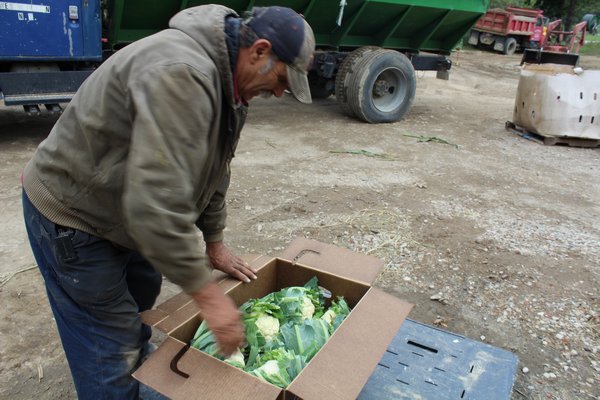
A few weeks after the Town of Southampton purchased the development rights on his 98-year-old farm, Edmund Densieski Jr. spent the workday the same way he has for six decades: working the land.On the last Thursday in September, it happened to be potato grading. The 65-year-old stood at the entrance of his barn with the squeal of the grader in the background, the air heavy with the dirt that is kicked up as thousands of potatoes are sorted, cleaned and bagged.
Mr. Densieski began working the land around Lewis Road in East Quogue when he was 5 or 6 years old, moving irrigation pipe around the fields. “The equipment is more modernized—it is not so much back-breaking as it used to be,” he said. As he spoke, he used a fork lift to pick up a pallet stacked high with 5-pound bags of potatoes and drove them into a corner of the barn.
“US Number Ones,” or standard-size potatoes, are bagged and distributed to Long Island grocery stores like King Kullen. Bigger taters or “Chef Potatoes” are pulled out and sold to local restaurants, while the smallest spuds are shipped to Pennsylvania for canning.
“Trucks don’t like coming out on Long Island. Even the tolls are expensive,” explained Mr. Densieski. For that reason, most of his produce is distributed on Long Island.
Between 60 and 70 percent of his business is in wholesale vegetables like cauliflower or potatoes. As for the spuds, which used to be known as a Long Island crop, he admitted that “people do not eat potatoes like they used to.”
“I eat them almost every day,” said Mr. Densieski, who thinks people don’t want to spend the time to cook them anymore. He enjoys them all different ways, baked, mashed or even as home fries.
His love of agriculture and interest in keeping the land in production in part motivated Mr. Densieski to sell his development rights to the town.
“We like to preserve significant blocks of farmland if we can. This is a significant block,” said Mary Wilson, the town’s Community Preservation Fund manager, in reference to the transaction.
The fund, which was created in 1999, works to protect prime agricultural soil by allowing the town to purchase development rights on the property so that the land will, at least theoretically, stay in agricultural production. Town officials also take into consideration properties that offer the public scenic views. In Mr. Densieski’s case, the land had both attributes.
In 1918, when his father, Edmund Densieski, was 10 years old, Mr. Densieski’s grandparents moved to the property on Lewis Avenue.
“They worked on farms over there,” Mr. Densieski said of Poland, the native country of his grandparents, Antone and Constance Densieski. On Long Island, they also lived in Laurel and Calverton. They knew they wanted their own land, so they saved up. Mr. Densieski says his grandmother at one point told someone in Riverhead to “go find me a farm.” The person found them the 40 acres on the east side of the road, behind the stand.
“They grew everything. They farmed with horses. There were no tractors,” Mr. Densieski said. At the time, in 1918, East End farmers would raise livestock like pigs and cows as well as crops like corn, squash, tomatoes and, of course, potatoes. Farmers would sell some of their produce or byproducts, but the majority of the farm’s output was intended as a way to feed the family.
During World War II, Mr. Densieski’s father bought 50 more acres of land across the street. Now, Mr. Densieski operates around 200 acres, nearly 90 of which he owns.
One issue he faces now is the high cost of labor on the East End. In the summer it is particularly difficult to find field hands as, he said, “the landscapers are gobbling them up.”
“There’s help around now, because the landscapers are slowing up,” he said.
Many farmers on the East End share a similar sentiment: It is difficult to compete with the wages that landscapers pay their employees. However, Mr. Densieski has a few people who have been working for him for years, which helps.
His daughter, Jeanine Recchion-Oudeans, is also involved in the business. Although she works at Quogue Elementary School, she does the payroll for the farm and “keeps the granddaughters under the thumb at the stand,” Mr. Densieski said with a laugh.
His grandson is talking about farming one day, and worked with the tractor last summer, but, Mr. Densieski noted that he is only 13.
One difficulty of growing potatoes is their susceptibility to disease. This past spring, a representative of the Empire State Potato Club stopped by the farm to make sure that Mr. Densieski’s sweet potatoes were not affected by a disease that farmers were seeing in other parts of the state. Although his tubers were cleared, he welcomed the input.
“It is tough until it comes up, you don’t know,” he said, adding that he was nervous because “you’re putting a lot of money in the ground.”
Despite the troubles, Mr. Densieski admits, “I’d go crazy if I couldn’t farm.”
He paused, and then said, “They ask me, ‘How long you gonna farm for?’ I say, ‘Until they close the lid on the coffin.’”